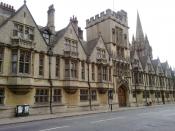The novel "Lord of the Flies" written by William Golding does reflect the time in which it was written (just after the war) to a certain extent and it does show the beliefs of the author, but I do not believe the novel will endure throughout time because it's not successful in revealing universal messages about humans.
William Golding was born in Cornwall in 1911 and was educated at Marlborough Grammar School and at Brasenose College, Oxford. His father was a schoolmaster and his mother was a suffragette. He was brought up to be a scientist, but revolted. After two years at Oxford he read English literature instead and became a devoted writer. He spent five years at Oxford, published a volume of poems in 1935, then joined the Royal Navy in 1940 and spent six years afloat, except for seven months in New York and six months helping Lord Cherwell at the Naval Research Establishment.
He saw action against battleships (at the sinking of the Bismarck), submarines and aircraft. He finished as Lieutenant in command of a rocket ship. He was present off the French coast for the D-Day invasion, and later at the island of Walcheren. After the war he returned to teaching, and began to write again. Lord of the Flies, his first novel, was published in 1954. It was later filmed by Peter Brook in 1963.
The novel is themed heavily around conflict, the savagery of man and abuse of power, as a war had just finished it reflects the pointless human savagery that starts because of different beliefs and therefore reflects the social/historical context in which it was written. In the book Jack and his tribe have no rules or plans to get rescued from the island; Jack uses the beast to...


